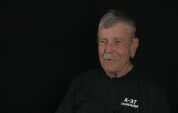5:19 | He was a military man from day one. Vic Grahn's father had served in World War II aboard the USS Hornet and, when he came of age, he decided on the Air Force. A new war beckoned from Southeast Asia and he didn't want to miss out. With a commission out of ROTC in hand, he began his pilot training.
Keywords : Vic Grahn Monona IA USS Hornet (CV-8) Jimmy Doolittle University of Oregon Williams Air Force Base Vietnam Cessna A-37 Dragonfly Republic F-105 Thunderchief close air support (CAS)

It was strange. Vietnam was a bit of a culture shock for Vic Grahn but he got over it. He was flying the A-37, a small jet aircraft designed for close air support to troops in contact (TIC). His base at Bien Hoa was the target of frequent rocket attacks which may or may not have disturbed the poker game.
A-37 pilot Vic Grahn and his buddy Jack Beam were working a target with napalm when a bullet came through his windsceen and exited the cockpit through a side window. There was no other damage to his plane so he returned to the attack. Then Jack's plane took a hit as well but he, too, pressed on. You would think that the brass would like that but they didn't.
A-37 pilot Vic Grahn was having a good time, unlike so many others in Vietnam. He had good friends, flew a good aircraft and had a good bar at the air base to relax in. If only he didn't have to smell that damn fish sauce.
There were no real anti-aircraft guns per se down in IV Corps. Vic Grahn took a lot of small arms fire and the occasional 20mm on his missions, which were often in support of troops in contact (TIC). He flew the A-37, a small highly maneuverable aircraft and that maneuverability came in handy when he was up in III Corps where the trees are bigger.
When it gets close to time to go home, for some reason, the danger increases. Some died during their last few days, but Vic Grahn made it back from Vietnam and didn't even get the rude greeting so many did when they returned. He became a flight instructor and nursed a bitterness towards the powers that be who abandoned the war when we had it won.
What should future generations remember about the war in Vietnam? For Vic Grahn, it's all about those who fought the war being abandoned by their own leadership and the general public. What song takes him back? The answer is surprising though totally logical.
Vic Grahn flew a variety of fighters during the post-Vietnam Cold War. It was frustrating; lobbying and waiting for the sweetest assignments. It's all about the connections and, after a chance meeting with a general, it was smooth sailing until retirement.